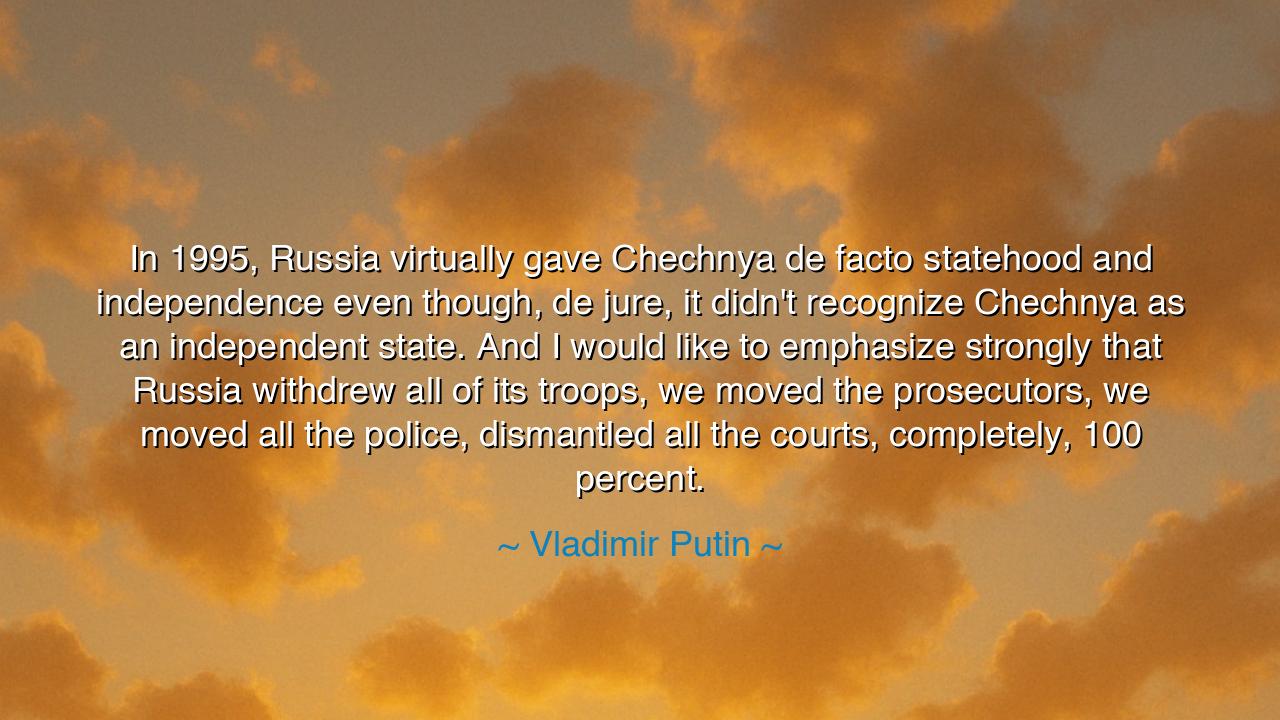
In 1995, Russia virtually gave Chechnya de facto statehood and
In 1995, Russia virtually gave Chechnya de facto statehood and independence even though, de jure, it didn't recognize Chechnya as an independent state. And I would like to emphasize strongly that Russia withdrew all of its troops, we moved the prosecutors, we moved all the police, dismantled all the courts, completely, 100 percent.






“In 1995, Russia virtually gave Chechnya de facto statehood and independence even though, de jure, it didn't recognize Chechnya as an independent state. And I would like to emphasize strongly that Russia withdrew all of its troops, we moved the prosecutors, we moved all the police, dismantled all the courts, completely, 100 percent.” Thus spoke Vladimir Putin, a man forged in the crucible of power and history, whose words echo not only through the politics of nations but through the timeless struggle between independence and authority, between order and freedom. His statement is not a boast, nor a mere record of events; it is a meditation on the fragile line between sovereignty granted and sovereignty seized, between peace offered and peace sustained.
The origin of this quote lies in the turbulent years of post-Soviet Russia, when the empire had collapsed and the borders of the new nation trembled like the earth after an earthquake. Chechnya, a small republic in the North Caucasus, had long yearned for independence, and in the chaos of the early 1990s, it rose in rebellion. The First Chechen War (1994–1996) was a brutal conflict — a clash not only of armies, but of identities, of history itself. When Putin speaks of 1995, he recalls the moment when Russia, weary of bloodshed and political exhaustion, pulled back — not in defeat, but in reluctant concession. The troops were withdrawn; the courts dismantled; the trappings of statehood, though not recognized on paper, were allowed to function in practice. De facto independence had been given, though de jure — in law — it remained denied.
In this, we see one of history’s oldest paradoxes: that power can yield without surrendering, and freedom can exist without being named. Nations, like people, often live in this twilight — between what they are and what they are allowed to be. The ancient Greeks understood this duality well. When Athens granted autonomy to her colonies, it did so to maintain peace — yet beneath the surface, the will to control remained. So too, Russia in 1995 allowed Chechnya the semblance of self-rule, but withheld recognition, as if to say, “You may act free, but only so long as we permit it.” Such half-measures are the language of empires in decline, and of leaders who understand that the sword cannot always win what the heart refuses to yield.
But this quote also bears the weight of Putin’s later perspective — the awareness of what followed. For after this brief experiment in autonomy, Chechnya descended into chaos: warlords rose, law collapsed, and the fires of rebellion rekindled into full war once more. When Russia returned, it did so not as a conqueror reclaiming foreign soil, but as a state reasserting its wounded unity. Thus, when Putin speaks of total withdrawal — of removing “prosecutors, police, and courts, completely, 100 percent” — there is both pride and warning in his tone. He reminds his listeners that independence, if granted without structure, can become self-destruction; that freedom without order is as perilous as order without freedom.
This tension between independence and stability has echoed throughout human history. The Roman Republic, in its later days, faced the same dilemma: regions once loyal turned to rebellion, and leaders debated whether to grant autonomy or impose control. When Caesar crossed the Rubicon, it was not merely a march of soldiers but of ideas — a step toward central power after the failure of distributed freedom. So too in Russia’s case, the empire’s fragments sought self-rule, yet in the absence of balance, chaos bred only the return of the sword. It is a pattern as ancient as civilization itself: where freedom is unguarded, power returns; where control is absolute, rebellion smolders unseen.
Putin’s reflection, therefore, is not only political — it is philosophical. His words urge us to see that independence, whether of nations or individuals, is not sustained by separation alone, but by responsibility. To rule oneself requires more than the absence of another’s rule; it requires discipline, justice, and vision. In giving Chechnya freedom “de facto,” Russia offered the form of sovereignty, but not the foundation to sustain it. And therein lies the lesson: freedom without structure is like a flame without oil — it burns brightly for a moment, then dies in darkness.
Let this be the teaching carried forward: independence is a sacred gift, but one that must be guarded by wisdom. Whether in the life of a person or the destiny of a people, liberty is not simply the act of standing alone — it is the art of standing rightly. The Chechen story, and the tone of Putin’s remembrance, warn us that the cost of freedom is not only struggle, but stewardship. He reminds future generations — leaders and citizens alike — that to build a lasting peace, one must balance courage with care, and sovereignty with order.
And so, remember this: to be independent is not merely to be free from control, but to be worthy of freedom — to govern oneself with strength and compassion, with vision and restraint. For liberty that forgets responsibility soon returns to chains, and power that forgets humility soon crumbles into ruin. Thus, from the mountains of Chechnya to the halls of every kingdom, the eternal law remains: independence is not a gift to be taken; it is a trust to be earned, and to be honored.






AAdministratorAdministrator
Welcome, honored guests. Please leave a comment, we will respond soon